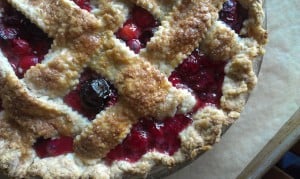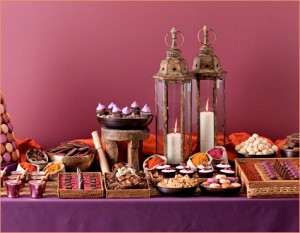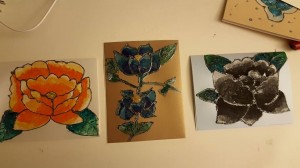“And the point is, to live everything. Live the questions now. Perhaps you will then gradually, without noticing it, live along some distant day into the answer.”
– Rainer Maria Rilke, Letters To a Young Poet, Letter Four (16 July 1903)
My earlier post on Ramadan was a nostalgic look back to simpler times, when I was young and issues of spirituality and identity simmered on the back-burner…only to crop up again during my “quarter life crisis.” I always assumed I would experience Islam like everyone else, in a stereotypical cyclical fashion: first there’s the period of imitation and perhaps tepid questioning, followed by periods of dissent coinciding with puberty, and then comes a period of learning and understanding of the religion itself, and finally as you get older a general sense of resolution and acceptance, resulting hopefully in peace of mind.
Yeah, I had no idea.
Not only is everyone’s experience uniquely their own but for me at least, it’s largely been a series of mini “cycles” on loop, with a particular tendency to languish in the questioning and dissension sector of the cycle. I am a work in progress, indeed.
You see, there was time when I did not particularly care for Ramadan.
I’m going to let that hang there for a second.
Before you say anything, I would recommend reading the entire piece. There is a story here, I promise. A happy one, I might add, but until then you’ll have to forgive the dramatics.

Basically, with Ramadan approaching, I would lose all this supposed “life momentum” when really, I was acting like a five-year-old whose favorite toy had been taken away because she hadn’t eaten her vegetables. Don’t get me wrong. I would observe Ramadan like everyone else. I’d fast, pray on time (or at least try to), read the Quran (sans tafsir, but still), help out at Iftar get-togethers (which sometimes were extended and so I’d still be serving bits of food and drink at 1 am) and with the help of shifty, extended family friends, privately donate to charities in far-flung villages of Pakistan. In other words, for all intents and purposes I was an ideal, practicing Muslimah.
But the truth is I felt like a hypocrite. It didn’t matter which part of the world we were in, the city would eventually cough up a few Muslims and allow us come together, pray, observe Ramadan and its associated rites and rituals. I remember once, sitting with a group of women who, after undertaking recitation of the Quran, would ask the oldest/wisest among them to lead a special prayer. Many would whisper their own special prayer requests to her before hand (on children, marriages, jobs, sickness, etc.) and we would listen and say Ameen at the appropriate places. Occasionally however, a couple of women, overcome with emotion would burst into tears interspersed with calls of Ya Rabb, Ya Rabb (O God, O God). Not to belittle their moment, but I can only assume this is what rapture looked like. Honestly though, I couldn’t wrap my head around this. It bothered me but not because of the act itself but because I couldn’t muster up that emotion, that passion. I think I actually cried for the very first time that day and not because I was overwhelmed. I just felt completely cut off and excluded from this club of women whose spiritual connection appeared stronger than mine.
I could blame my malaise on a number of things; my level of faith, my upbringing, lack of affiliation with a quasi-non existent local Muslim community or on God’s will. But I refuse to consider these or dwell on them. For me (and for many people, I am positive), accepting and observing such rites and rituals was not an overnight thing.
I asked my mother, growing up, if she ever questioned her parents about observing Ramadan.
“Let’s just say we didn’t give our parents as hard a time as you give us,” she replied.
“So that’s a no?”
She laughed. “We did things by example. I fasted because my parents told me to. I did it because that’s what’s expected of good Muslims.”
For me at the time, I didn’t feel like a particularly “good” Muslim. In addition to my own internal jihad, the world around me kept providing me with more questions to dwell on.
For instance, there was Mai, our former cleaning lady from Sargodha, a city in southern Punjab known for its agriculture. She told us she was from a farming town. The local landowners hired them during harvest season and were paid in kind for their back-breaking labour. It also explained why her skin was so dark. There was nothing glamorous about her tan; she was of the color of burnt toast with rough hands and watery, brown eyes. She explained how hard it was, even with all the wheat and rice, supporting extra members of the family. We hired her to mop our floors and tend to my grandmother’s potted rose plants. She disappeared the next harvest season, and really, who could blame her.
My mother tried to explain to me how people like her have been effectively fasting their entire lives. They wake up before dawn, spread churned butter and sugar over last night’s bread and hopefully down it with fresh milk or tea. They work in the fields all day, come home later to dinner. If there are boys in the family they’d be out with them, otherwise the girls will clean the home, look after toddlers, and hopefully have some curry stewing over the hearth (ovens requires gas and that’s a luxury in itself). Finally the family breaks bread together at the end of the day. I didn’t understand how they would appreciate a lesson in patience. What would these people have to learn after living this day for the next “x” number of days? Ramadan was about giving up life’s pleasures but what pleasure(s) were they giving up?
For Uncle Bobby, Ramadan was just another month on the calendar. He owns a garage in Lahore and is a friend of my father’s from grade school, before life took them their separate ways. Uncle Bobby’s dad once owned one of the few vintage cars in the country. We met up with them one summer. We learned that his mother had had a stroke the previous winter and was expected not to recover. I remember visiting her. She just lay there, staring glassy eyed at me, reeking of old diaper and urine. I don’t remember her face anymore, but I will never forget the smell. Uncle Bobby worked all day, coming home to the worst bouts of power outages and to a family with their own demands and expectations, relieving the day nurse to care for his mother through the night. He would clean her, feed her and turn her over several times during the night. Sometimes she’d call out to random people and even insist on fasting. That’s when they would feed her intravenously. His wife works at a school within the district, her paycheck contributing to the family’s overall income. And through it all, he would sit there, stoic, eating his dinner at a late hour, barely surviving on a cup of tea and rusk in the morning, and not because money was tight (although he’s not a frivolous man, I’m told), but because that’s how he dealt. I didn’t understand how Ramadan would improve this man’s life.
My 14-year-old mind tried grappling with this. With the seeming unfairness of it all. The perpetual “whys” and “how comes” and countless other encounters that left more even more confused than before. Again at 20, and finally somewhere around, well, many years later, it dawned on me. There was no crescendo of soaring violins, no cold wind rushing in loosening some previously dormant idea in my head. Nothing of particular significance happened that precipitated my epiphany, which on hindsight is rather cliched but apt.
I fast to press pause. To stop the rat race. To remember that those red, lacquered Loubotins will not necessarily rock my world. To know that my life is complicated because I made it so. It tells me that I need to feel connected to a higher power. It tells me that I’m missing out on what’s important. And most importantly it tells me to be grateful for every breath I draw that is painless and unconscious. It tells me I’m still alive and there’s more work to be done.
As far as the Mais of the world are concerned or people like Uncle Bobby, I still cannot fathom an answer to “why” them. Although I may spend much of life guessing at answers (probably the wrong ones) and continue to worry about destiny and freewill, I have the choice to take that all important leap of faith and believe in His justice. It took me years to get here and will probably take many more to find that peace of mind but I am no longer the five-year-old who refuses to eat her greens. Ramadan no longer scares me. I am where I am and that is ok.
Elahi Ameen.
For more on Ramadan, and to read the rest of the posts in MMW’s Ramadan 2012 series, click here.











